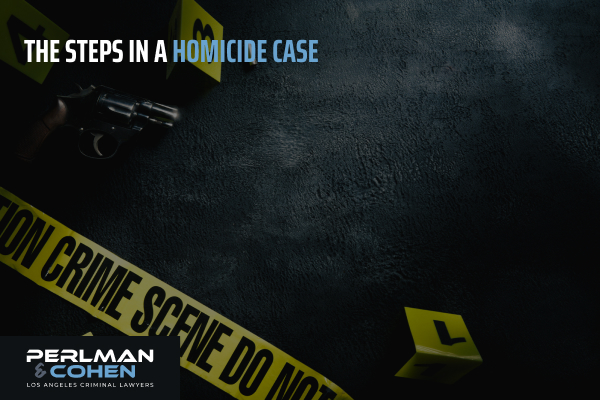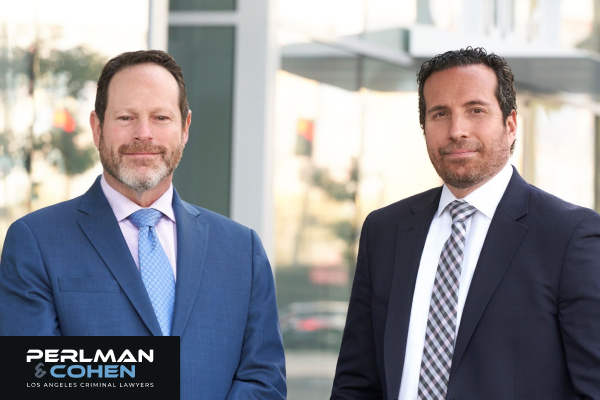
Homicide charges are serious accusations that someone has unlawfully caused the death of another person. They signal that the state believes you have played a role in ending a human life. Whether these charges are due to intentional actions or accidents, they have legal and social implications.
It's important to understand what these charges entail and the potential consequences. At Perlman & Cohen Los Angeles Criminal Lawyers, we understand the risks involved in a felony murder charge.
Homicide charges can range from manslaughter, which might involve less culpability, to murder, which implies a more deliberate action. The specifics of the charge can significantly affect the legal strategy and potential outcomes.
Facing such charges means you're in a situation where your freedom, reputation, and future are at stake. It's a critical time to seek knowledgeable and experienced legal representation.
In California, homicide charges include a wide range of offenses. These could range from involuntary manslaughter to first-degree murder. The law differentiates these charges based on the accused's intent, the circumstances of the death, and the degree of negligence involved. Each type of charge comes with its own legal definitions, potential defenses, and penalties.
For example, first-degree murder includes killings that are premeditated, committed with malice aforethought, or occurred during the commission of a dangerous felony. Second-degree murder involves killings that are intentional but not premeditated.
Manslaughter charges, both voluntary and involuntary, usually apply to deaths that occur without the intention to kill. They usually include circumstances that involve lesser degrees of fault.
Murder and manslaughter are both serious charges, but they differ in key aspects such as intent and circumstances. Murder involves the intentional killing of another human being with malice aforethought. This means the accused had a clear intent to end a life or cause serious bodily harm that resulted in death.
Manslaughter, on the other hand, refers to the unlawful killing of a human being without the same level of intent. This can include voluntary manslaughter, where the act is committed in the heat of passion, and involuntary manslaughter, where death results from reckless or negligent actions. Understanding these distinctions is crucial for anyone facing murder charges.
First-degree murder is the most serious homicide charge. It involves premeditated, intentional killing or death caused during the commission of certain felonies. Second-degree murder is still intentional but lacks premeditation. It can also include deaths caused by dangerous conduct and an obvious lack of concern for human life.
Voluntary manslaughter usually occurs in the heat of the moment, often as a response to a provocation that would cause a reasonable person to act irrationally. Involuntary manslaughter involves unintentional killing as a result of recklessness or criminal negligence. Each classification has its own set of legal nuances and implications.

Facing a murder charge in California can drastically alter your life. The accusation alone can impact your reputation, personal relationships, and employment opportunities. If convicted, the penalties range from significant prison time to, in extreme cases, the death penalty for certain first-degree murder charges.
Legal proceedings in homicide cases are complex and involve several stages, including arraignment, pre-trial hearings, and possibly a trial. Each stage offers opportunities for defense strategies to reduce or dismiss charges. The legal system aims to ensure justice, but a strong defense is essential due to the stakes involved.
Penalties for manslaughter charges vary widely. For first-degree murder, California law prescribes 25 years to life in prison, with certain circumstances elevating this to life without parole or even the death penalty. Second-degree murder convictions can lead to 15 years in prison. Voluntary manslaughter might result in up to 11 years in prison, while involuntary manslaughter can lead to four years.
These sentences can be enhanced based on factors like the use of a firearm, prior convictions, or the victim's status (e.g., a police officer). Legal statutes such as the California Penal Code sections 187-199 provide the framework for these penalties and enhancements. Understanding these guidelines is critical for anyone navigating a homicide charge.
Several factors can increase the severity of a sentence in a homicide case. Using a weapon, especially a firearm, during the commission of the crime often leads to longer prison terms. Crimes committed against law enforcement or government officials are taken particularly seriously and can result in the harshest penalties.
Furthermore, the court may impose a more severe sentence if the defendant has prior convictions, especially for violent crimes. The presence of certain aggravating circumstances, like committing a homicide to benefit a gang, can also enhance sentences. Recognizing these factors is crucial for developing an effective defense strategy.
In homicide cases, evidence and forensic analysis play pivotal roles. They can prove or disprove key aspects of the prosecution's case, such as the cause, time, and presence at the crime scene. Forensic evidence like DNA, fingerprints, and ballistic analysis can be critical in proving guilt or innocence.
Defense teams often rely on independent forensic experts to challenge the prosecution's evidence. Questioning the methods used to collect, preserve, and analyze evidence can lead to doubts about reliability. A strong focus on forensic details can uncover mistakes that impact the case's outcome.

At Perlman & Cohen Los Angeles Criminal Lawyers, we understand the gravity of facing murder charges. We offer comprehensive legal representation, meticulously examining every aspect of the prosecution's case. Our approach involves scrutinizing the evidence and identifying weaknesses in the state's case. Then, we develop a robust defense strategy tailored to your unique situation.
Our team collaborates with forensic experts to challenge the prosecution's evidence. We will present alternative narratives. We prioritize clear communication with our clients. We ensure they understand every step of the legal process.
With Perlman & Cohen, you're not just getting a lawyer. You're gaining a dedicated, experienced criminal defense lawyer to fight for the best possible outcome.

Plea negotiations can offer a way to resolve a case without a trial. This process involves agreeing to plead guilty to a lesser charge. Then, you might receive a reduced sentence. It's a critical decision that requires careful consideration of the evidence against you. We will review potential penalties and the likelihood of acquittal at trial.
An affirmative defense involves admitting the crime but presenting why the defendant should not be held responsible. Common affirmative defenses in homicide cases include self-defense, defense of others, and insanity. Successfully arguing an affirmative defense requires compelling evidence and a persuasive legal strategy.
Getting a homicide case dismissed is a formidable challenge but not impossible. Grounds for dismissal may include insufficient evidence or violating the defendant's rights. We can even target procedural errors. We must demonstrate that the prosecution lacks the evidence to prove guilt beyond reasonable doubt.
If convicted, presenting mitigating factors at sentencing can significantly affect the outcome. These factors might include:

If you or a loved one is facing homicide charges, time is of the essence. Contact Perlman & Cohen Los Angeles Criminal Lawyers for a comprehensive case evaluation. Contact us today for a case consultation.
"*" indicates required fields






If you or a loved one needs the assistance of our criminal law attorneys, please feel free to contact us in the way that is most convenient to you, whether that is calling us at (310) 557-1700 or completing the contact form below. All fields are required.